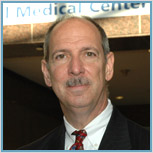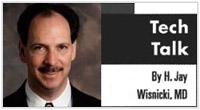 |
||||
|
||||
|
Internet has great potential for reshaping medicine
An interview with Mike Maples, former Microsoft executive vice presidentBy H. Jay Wisnicki, MD Published in Ophthalmology Times In this new era of consumerdriven health care, information technology has the potential to change totally the way physicians provide care, according to Mike Maples, one of the world's foremost authorities on software development and marketing. As significant, Maples, 57, said, the Internet will enable physicians to improve their communication with patients vastly. Comments such as these have circulated within the healthcare industry in recent years; however, they assume far greater importance when made by someone with Maples' credentials. He spent 23 years with IBM Corp., where he was director of software strategy. Maples left IBM to join Microsoft Corp., holding the position of executive vice president of worldwide products. As a member of the Office of the President, reporting directly to Bill Gates, he was responsible for all Microsoft product development and product marketing. Since resigning that position in 1995, Maples has worked as a consultant and adviser. In an interview with Ophthalmology Times, Maples described this age as a time of "economic transition"when people have the ability to communicate rapidly using a computer over long distances. The result, he said, "is a lot of turmoil." "There is a great deal of opportunity for the existing 'haves' to lose out and for new institutions to take their place," Maples said. "That comes about when one is willing to rethink what it is you're trying to provide. It is a service? Is it a product? Who are your customers?" Often, he said, a certain amount of "disintermediation" occurs a time "where somebody who provided value in the past doesn't necessarily have that same value in the future chain of commerce or chain of activity." For example, in the past, Maples said, manufacturers would look at their customers as wholesalers; wholesalers would consider retailers to be their customers; and retailers would think their customers were consumers. Nowadays, Maples said, someone could easily take the opposite view. "Say I am the customer. What would be best for me? It may turn out, in many instances, to talk directly to the manufacturer," he said. The implications for health care are vast, with the Internet and information technology affecting the basic structure of health care and holding the potential of totally changing the way physicians provide care, he said. For starters, he said, information technology through the Internet could determine the right number of physicians in a particular practice. "I think health care may be the luckiest (industry) because (doctors) already know there are going to be big changes," Maples said. In contrast, there will be some industries such as food distribution where wholesalers won't want much change. Consider the potential that the technical capabilities of the Internet hold for a newly appointed head administrator or chief executive officer of a multispecialty medical facility. In Maples' view, that person should focus immediately on the "ultimate consumer of the I goods and services' that that institution providesthe patient. "I would try to find out from them the things that didn't work, or what they were dissatisfied with, whether it was the waiting, or the cost, or the accuracy or the amount of information that was dissatisfying," Maples said. "Then I would think how I can eliminate those factors and maybe come up with some ideas that were not technically possible in the past and that the new technology allows me to think 'out of the box' or significantly differently from the way I would have. "I am sure a lot of decisions are made on 'Well, we can't support that in our administrative center' or 'We can't support that because we don't have that information' or 'We don't have the time to do that.' But I would deal with (all of that) by trying to find new solutions for old problems." Next, Maples said, administrators must educate everyone within their facility about the new technology, including the administrator's "partners," the doctors, and its clerical staff. "Everyone needs to have this open mind (so the facility can) use and understand the technology," he said. "Then it's seeing how bright people discover how to apply things to their jobs." What's at stake for the physician? In particular, doctors could do considerable marketingby beginning to communicate through electronic mail with the direct purchasers of their products (their patients)through "customer satisfaction surveys, Maples said. Another issue, he said, is patients gaining access to more information. "I would like to have a bigger part in determining what to do about me," he said. "Right now, the insurance systems and the doctor systems don't really provide much information. But I can see that every time I went to the doctor that I'd get copies of the results of the blood test and I think all of this is available if someone takes time to do it. "But you could routinely send me the blood test results and doctor's notes and communicate with me about this information. I take a blood test every month. It would be great if a doctor would remind me. So I think it's a combination in my case of better and more information that I could think about and act on every day. That would probably be the biggest thing a doctor could do to help me," he said. What about physicians who, for whatever reason, may resist sharing more information with their patients? "Well, I'd say that in all this intermediation thing that more and more people are educated and that health care is so complex that if you don't involve the patient in a wellness strategy, you'll never have satisfactory results," Maples said. "So I would look at it this way: how can I deal with this particular patient not so much as a something that I am all knowing and unknowing but more (as something) together. The patient will become a 'general practitioner' and I'll be the 'adviser and counselor.' " At the same time, patients through the Internet now have access to enormous amounts of information about health care that, until recently, only physicians could obtain. In dealing with these patients, Maples said the physician should not shy away from this interest. Instead, he recommended that the physician "assume that the person is intelligent." Additionally, he said, " patients are showing an interest in wanting to participate. So given that they're interested and that they're going to do something, often researching out issues is simpler. I think it's involving the patient more in what the doctor believes is the treatment and then just be willing to get questioned about what you do right or wrong. Even though he admits that he doesn't know a great deal about health care, Maples said, "It's one of the industries that probably has the greatest opportunity of having technology affect it." Describing himself as "officially retired," Maples lives on a ranch in Texas about 50 miles from the nearest city. He said he spends about 40% of his time advising small startup companies or charitable organizations. The rest of his time is consumed with travel or education. In April he joined the board of directors of Houstonbased Mission Critical Software, Inc., a leading provider of Windows NTbased systems management solutions for Internet and enterprise networks. The company develops and markets products that, it says, provide simpler, less costly, and more secure administration and operation of corporate and service provider networks. Maples regularly taps the Internet to read local and national newspapers and to find out what's playing at the movies. He also makes purchases on it, something he said his son used when buying an engagement ring for his girlfriend. "It cost one third less than if he had purchased it in Austin," Maples said, "and he didn't have to pay taxes on it." |
Copyright ©2006 H.J. Wisnicki, MD All Rights Reserved
